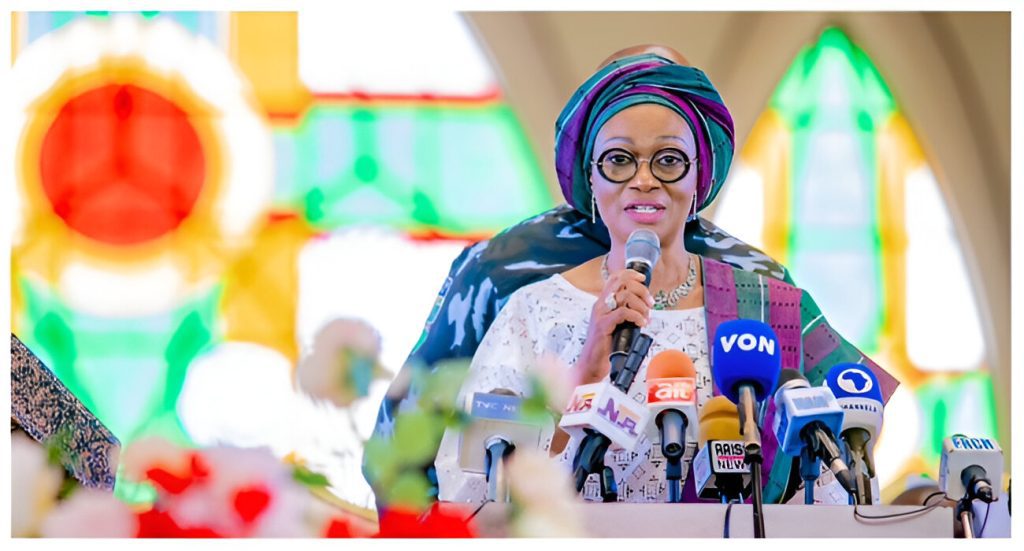On Thursday, Senator Remi Tinubu, the President’s wife, donated N1bn to help get rid of tuberculosis in the country by 2030.
Mrs Tinubu gave the money in Abuja after being named the Global and National Stop TB Champion by the Global Stop TB Partnership.
The PUNCH reported that the wives of 36 state governors also became Stop TB champions in their respective states.
According to the World Health Organisation, TB is a disease caused by a bacterium (Mycobacterium tuberculosis) that often affects the lungs.
The infection spreads through the air when people with lung TB cough, sneeze, or spit. A person only needs to breathe in a few germs to get infected.
In 2022, WHO reported that 1.3 million people died from TB, including 167,000 people with HIV. Globally, TB is the second leading infectious killer after COVID-19 (above HIV and AIDS).
Specifically, Nigeria is ranked sixth and is the country with the highest burden of TB in the world and Africa.
During the event, Tinubu mentioned that she accepted the appointment as a call to action to end TB in the country by 2030.
She said, “It is not impossible to end TB by 2030 with the active support of everyone here today. I appreciate the efforts of all stakeholders at the national, regional, and global levels in addressing the TB epidemic.
“I congratulate the first ladies who have become TB champions in their states. This title is not just a formality, but it's about using your positions to raise awareness about TB and putting an end to the associated stigma.
“With this in mind, Renewed Hope Initiative has decided to support the fight to end TB by 2030 with a donation of N1bn. We also call on all well-meaning Nigerians to help in this fight.”
Mrs Tinubu mentioned that following the adoption of the 2023 political declaration at the United Nations High-Level Meeting, President Bola Tinubu is fully committed to the fight against TB and achieving the goals set in the political declaration.
“Nigeria has made significant progress in the fight against TB and is not slowing down in its efforts to completely eradicate TB, even before the 2030 target.
“However, I urge the government, legislators, private partners, development partners, civil society organizations, healthcare professionals, academia, market traders, communities, religious leaders, traditional leaders, and individuals to step up their efforts to work towards ending TB by ensuring that everyone has access to quality TB diagnosis and treatment services.”
The Coordinating Minister of Health and Social Welfare, Prof Muhammad Pate, mentioned that the government is currently equipping primary healthcare facilities with necessary resources and personnel to provide comprehensive services, especially in rural and underserved areas, with the aim of improving health outcomes and decreasing the burden of preventable diseases like TB.
Pate stated, “Our efforts to end the TB epidemic in Nigeria led to the expansion of TB treatment services (DOTs centers) to about 22,000 health facilities and GeneXpert equipment – a quick molecular TB test – to 512 as of the end of 2023.
The use of digital X-ray with artificial intelligence for TB screening is being expanded in Nigeria for key and vulnerable populations, including children. There are currently 51 mobile digital X-ray platforms in the program, and 350 more digital X-ray machines will be available before the end of June 2024.
As part of our plan to improve diagnosis, we have set up a strong specimen referral network using a hub-and-spoke model that transported over 2.4 million samples for TB tests in 2023.
Dr Lucica Ditiu, the Executive Director of the Global Stop TB Partnership in Geneva, praised Nigeria's efforts to eradicate TB.
Ditiu stated that Nigeria has a significant burden of TB, but the country has made remarkable progress. In 2023, Nigeria had 70 percent TB notification, compared to about 70 percent missing cases in the past. Ditiu emphasized the need for Nigeria to maintain this progress.
Nigeria is capable of diagnosing, detecting, and treating TB without technical assistance. There are also innovative ways to secure funds for TB response, especially from the private sector.
Nigeria has leaders who prioritize the health of their people and a collective effort is needed to end TB, according to Dr. Lucica Ditiu.
Dr. Queen Ogbuji-Ladipo, the acting board chair of Stop TB Partnership in Nigeria, noted that TB still disproportionately affects vulnerable populations and underserved communities, despite medical advancements.
However, she expressed hope due to the dedication of healthcare professionals, researchers, policymakers, and advocates who tirelessly work to combat TB and improve the lives of those affected.



